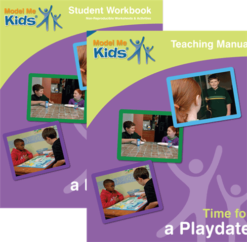Time for a Playdate™
Autism Play Skills
Time for a Playdate™ models children interacting during playdates using social skills outside the classroom in play activities with peers.
Elementary, Middle School
Run Time: Approx. 67 Minutes
Watch Preview
Time for a Playdate™
Topics
Greet Friend
Share
Guest Chooses
Stay with Friend
Losing is OK
Talk on Topic
Answer
Play His Way
Eye Contact
Clean Up
Say Goodbye
Manual & Workbook
The teaching manual and student workbook for this video promote learning through adaptable lesson plans paired with visual exercises. These resources support skill acquisition in the classroom, at home, and in the community.

About the Video
The Time for a Playdate™ video presents social skills in the context of several playdates. It features elementary school-aged children demonstrating appropriate social skills on a playdate. Each scene lasts between 30 seconds and 3 minutes, depending on the chapter. At the end of each chapter is a storyboard summarizing the rules taught. The video is hosted by the young children in the video, who narrate each scene. The visual is combined with narration and graphics that help explain the particular rule. Each social skill is demonstrated in more than one situation and across environments. This is useful to children with Autism because it helps with generalization of the skill taught.
Shop
Challenge
Children with Autism often exhibit unique play patterns and preferences, making it essential to understand and support their individual needs.

Skills
Social skills, including turn-taking, sharing, and cooperative play, are crucial for fostering meaningful connections.

Benefits
Social skills are an integral aspect of a child’s development, influencing not only their social interactions but also cognitive, emotional, and sensory integration.

Video Modeling
Using visual aids like video modeling helps promote social engagement and contribute to a well-rounded approach to skill development.
Autism Play Skills
Teaching play skills to children with Autism is crucial for their overall development, fostering social, cognitive, and emotional well-being. The controlled environment of video modeling enables children to practice and reinforce these skills at their own pace, promoting generalization to real-life situations. The visual nature of video modeling enhances comprehension, making it an effective and individualized method for teaching play skills to children with Autism.
Play is a fundamental avenue for communication and interaction, offering opportunities to practice social rules and engage with peers. For children with Autism, who may face challenges in socialization and communication, targeted play interventions provide a structured and supportive environment to develop these skills.
By teaching play skills, educators and therapists empower children with Autism to navigate social situations, form meaningful connections, and participate more fully in various aspects of life. It lays a foundation for future social success and overall well-rounded development.

